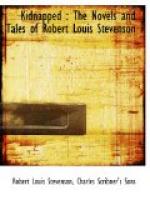The second day I crossed the island to all sides. There was no one part of it better than another; it was all desolate and rocky; nothing living on it but game birds which I lacked the means to kill, and the gulls which haunted the outlying rocks in a prodigious number. But the creek, or strait, that cut off the isle from the main-land of the Ross, opened out on the north into a bay, and the bay again opened into the Sound of Iona; and it was the neighbourhood of this place that I chose to be my home; though if I had thought upon the very name of home in such a spot, I must have burst out weeping.
I had good reasons for my choice. There was in this part of the isle a little hut of a house like a pig’s hut, where fishers used to sleep when they came there upon their business; but the turf roof of it had fallen entirely in; so that the hut was of no use to me, and gave me less shelter than my rocks. What was more important, the shell-fish on which I lived grew there in great plenty; when the tide was out I could gather a peck at a time: and this was doubtless a convenience. But the other reason went deeper. I had become in no way used to the horrid solitude of the isle, but still looked round me on all sides (like a man that was hunted), between fear and hope that I might see some human creature coming. Now, from a little up the hillside over the bay, I could catch a sight of the great, ancient church and the roofs of the people’s houses in Iona. And on the other hand, over the low country of the Ross, I saw smoke go up, morning and evening, as if from a homestead in a hollow of the land.
I used to watch this smoke, when I was wet and cold, and had my head half turned with loneliness; and think of the fireside and the company, till my heart burned. It was the same with the roofs of Iona. Altogether, this sight I had of men’s homes and comfortable lives, although it put a point on my own sufferings, yet it kept hope alive, and helped me to eat my raw shell-fish (which had soon grown to be a disgust), and saved me from the sense of horror I had whenever I was quite alone with dead rocks, and fowls, and the rain, and the cold sea.
I say it kept hope alive; and indeed it seemed impossible that I should be left to die on the shores of my own country, and within view of a church-tower and the smoke of men’s houses. But the second day passed; and though as long as the light lasted I kept a bright look-out for boats on the Sound or men passing on the Ross, no help came near me. It still rained, and I turned in to sleep, as wet as ever, and with a cruel sore throat, but a little comforted, perhaps, by having said good-night to my next neighbours, the people of Iona.
Charles the Second declared a man could stay outdoors more days in the year in the climate of England than in any other. This was very like a king, with a palace at his back and changes of dry clothes. But he must have had better luck on his flight from Worcester than I had on that miserable isle. It was the height of the summer; yet it rained for more than twenty-four hours, and did not clear until the afternoon of the third day.




